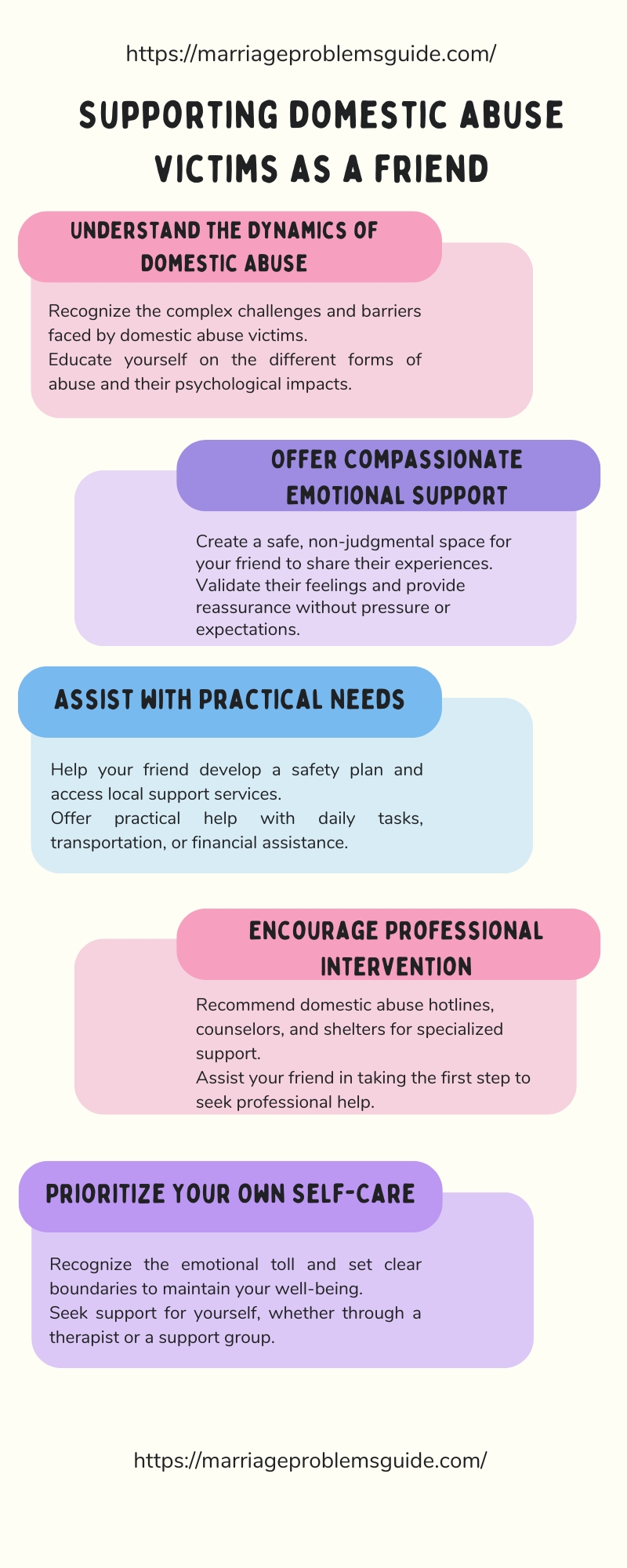Domestic abuse is a pervasive and devastating issue that affects millions of people worldwide. As a friend, you can play a crucial role in supporting and empowering those who are experiencing this type of abuse.
Your compassion, understanding, and practical assistance can make a significant difference in the lives of domestic abuse victims.
This blog post will guide you through the steps to effectively support a friend who is a victim of domestic abuse. We will explore the complex dynamics of abusive relationships, the unique challenges faced by victims, and the ways you can provide meaningful and sensitive support.
By the end of this article, you will have a deeper understanding of how to be a reliable, trustworthy, and empowering ally for your friend.
1. Understanding Domestic Abuse
Domestic abuse, also known as intimate partner violence, can take many forms, including physical, emotional, sexual, and financial abuse. It is a pattern of coercive, controlling, and violent behavior perpetrated by one partner against another within an intimate relationship.
Abuse can occur in heterosexual or same-sex relationships, and it can happen in all socioeconomic, educational, and cultural backgrounds.
Victims of domestic abuse often face a complex web of challenges, including fear, shame, financial dependence, and social isolation. They may also feel trapped in the relationship due to a lack of resources or support, or fear of retaliation from their abuser.
It’s important to understand that leaving an abusive relationship can be an incredibly difficult and dangerous process, and victims often require specialized support and resources to do so safely.
2. Recognizing the Signs of Domestic Abuse
As a friend, being able to recognize the signs of domestic abuse is crucial. Some common indicators that a friend may be experiencing abuse include:
- Physical signs, such as unexplained bruises, injuries, or a change in their physical appearance
- Emotional signs, such as increased anxiety, depression, or changes in mood and behavior
- Social signs, such as withdrawing from friends and family, or their partner excessively controlling their social interactions
- Financial signs, such as their partner restricting their access to money or financial information
It’s important to remember that the presence of these signs does not necessarily mean that your friend is being abused, as some may have other explanations. However, if you notice a pattern of concerning behaviors, it’s essential to approach your friend with empathy and concern.
3. Providing Emotional Support
One of the most important ways you can support a friend who is experiencing domestic abuse is by offering emotional support. This involves:
- Listening without judgment: Create a safe and non-judgmental space for your friend to share their experiences. Avoid making assumptions or asking probing questions that could make them feel uncomfortable.
- Validating their feelings: Acknowledge the difficulty of their situation and validate their emotions, such as fear, anger, or confusion. Let them know that the abuse is not their fault.
- Offering reassurance and encouragement: Remind your friend that they are not alone and that there are resources and support available to help them. Encourage them to take small steps towards safety and independence.
- Respecting their decisions: Understand that your friend may not be ready to leave the abusive relationship, and that the decision to do so is complex and personal. Avoid pressuring them, and instead, focus on providing a supportive, non-judgmental presence.
4. Offering Practical Assistance
In addition to emotional support, you can also provide practical assistance to your friend who is experiencing domestic abuse. This may include:
- Helping to create a safety plan: Work with your friend to identify safe places they can go, such as the homes of trusted friends or family members. Assist them in gathering important documents, securing a safe mode of transportation, and making arrangements for their children or pets.
- Connecting them with resources: Provide information about local domestic abuse hotlines, shelters, legal aid, and other support services. Offer to help them make the initial contact or accompany them to appointments.
- Assisting with daily tasks: Offer to help with tasks like grocery shopping, child care, or household chores to alleviate some of the burden your friend may be facing.
- Providing financial support: If possible, consider offering financial assistance, such as helping with rent, bills, or other expenses. This can be particularly helpful for victims who are financially dependent on their abuser.
Remember to always discuss your level of involvement and support with your friend, and respect their boundaries and decisions.
5. Encouraging Them to Seek Professional Help
While your support as a friend is invaluable, it’s also important to encourage your friend to seek professional help from domestic abuse experts and counselors. These individuals have specialized training and resources to provide comprehensive support and guidance. Encourage your friend to consider the following:
- Contacting a domestic abuse hotline: Hotlines can connect victims with local resources, safety planning assistance, and confidential support from trained professionals.
- Meeting with a domestic abuse counselor or advocate: These individuals can help your friend understand the dynamics of their abusive relationship, develop a safety plan, and navigate the legal and social service systems.
- Visiting a domestic violence shelter: Shelters provide a safe, confidential, and supportive environment for victims, as well as access to a range of services, including emergency housing, counseling, and legal assistance.
Assure your friend that you will support them throughout the process of seeking professional help, and offer to accompany them to appointments or make the initial contact, if they are comfortable with that.
6. Maintaining Boundaries and Self-Care
Supporting a friend who is experiencing domestic abuse can be emotionally taxing and can sometimes put your own safety at risk. It’s important to maintain healthy boundaries and prioritize your own self-care to ensure that you can continue to be a reliable and effective ally.
Some key strategies for maintaining boundaries and self-care include:
- Recognizing your own limits: Understand that you cannot “save” your friend or “fix” their situation. Your role is to provide support and guidance, not to take on the burden of their abuse.
- Setting clear boundaries: Communicate to your friend what you are and are not comfortable doing to support them, and be firm in upholding those boundaries.
- Practicing self-care: Make sure to take care of your own emotional, mental, and physical well-being. This may involve seeking support from a therapist, engaging in stress-reducing activities, or taking breaks from the situation when necessary.
- Seeking support for yourself: Consider joining a support group or talking to a counselor who can provide guidance on how to best support your friend while also caring for your own needs.
Remember, your well-being is just as important as your friend’s, and maintaining healthy boundaries will ultimately allow you to provide more effective and sustainable support.
7. Navigating Challenging Situations
Supporting a friend who is experiencing domestic abuse can sometimes involve navigating challenging situations. Here are a few scenarios you may encounter and how to approach them:
- Your friend denies or minimizes the abuse: If your friend denies or downplays the severity of the abuse, avoid arguing or confronting them directly. Instead, express your concerns with empathy and reiterate that you are there to listen and support them whenever they are ready to open up.
- Your friend is reluctant to seek help: If your friend is hesitant to reach out for professional support, acknowledge their fears and concerns, and offer to assist them in the process. Provide information about local resources and let them know you will be there to support them, no matter what they decide.
- Your friend returns to their abuser: It’s not uncommon for victims to return to their abusers multiple times before ultimately leaving. Avoid judgment or criticism, and continue to provide a non-judgmental, supportive presence. Remind your friend that you will be there for them whenever they are ready to leave.
- Your friend’s safety is in immediate danger: If you believe your friend’s life is in imminent danger, it may be necessary to breach their confidentiality and contact the authorities or other emergency services. Explain to your friend why you are taking this step, and reassure them that your priority is their safety.
Throughout these challenging situations, it’s important to remember that your friend’s safety and well-being should be the top priority. Maintain a compassionate, non-judgmental approach, and continue to provide the support and resources they need to make informed decisions.
Conclusion
Supporting a friend who is experiencing domestic abuse requires empathy, understanding, and a commitment to providing a safe, non-judgmental space. By offering emotional support, practical assistance, and encouraging professional help, you can make a significant difference in your friend’s life.
Remember to maintain healthy boundaries and prioritize your own self-care, as supporting a friend in this situation can be emotionally taxing.
Through consistent, compassionate, and informed support, you can empower your friend to take the necessary steps towards safety, healing, and ultimately, a life free from abuse. Together, we can break the cycle of domestic violence and create a more just and equitable world.






